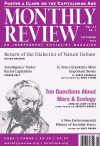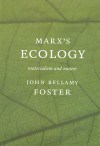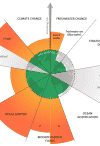Global

Revisiting the Bonn Notebooks
There is hardly any theme in Karl Marx’s theoretical corpus that has garnered as much traction as his theory of fetishism. Ever since Marx introduced the term into his critique of political economy in Capital, fetishism became a field of theoretical force. While much ink has been spilled on the specific content and theoretical scope of fetishism in Capital, young Marx’s initial exploration of the term has rarely enjoyed critical attention. | more…

Our current geological time period, characterized by drastic planetary shifts due to anthropogenic climate change, is popularly known as the Anthropocene Epoch. Recent proposals for naming the first age of this epoch highlight capitalism’s central role in the ongoing climate crisis. | more…

More than twenty years after the publication of John Bellamy Foster’s Marx’s Ecology (2000), ecosocialist scholars continue to explore the evolution of Marx’s ecological thinking, from the Greek atomists to his later work on ethnology. | more…

John Bellamy Foster’s recent work, The Return of Nature, makes a strong case that Marxism’s central, materialist conception of nature and history makes it the best possible theoretical basis for radical ecological scholarship. | more…

For nearly sixty years, H. Bruce Franklin has built a body of work that touches on everything Herman Melville to the military-industrial complex to a lowly, little-known fish that is a historical keystone of the U.S. fishing history. | more…

Time is running out for humanity to avoid a catastrophic planetary tipping point. Widespread mass mobilizations of populations worldwide must fight to bring about revolutionary societal changes and dismantle neoliberal monopoly capitalism, with its reliance on extractive exploitation of our planet’s resources and communities. | more…

A major deficiency of the growth-obsessed model driving global neoliberal economic policy is its lack of understanding on the Earth System on which it—and indeed, all life on Earth—relies. | more…

Climate imperialism has emerged as a new—and potentially even the most lethal—form of imperialism in the world economy today. Confronting it requires recognizing and dealing with all its different aspects. But it also requires addressing the monopolies of knowledge created by the global regime of intellectual property rights that has been instituted and cemented by hegemonic world powers. | more…

As climate change and the deforestation of the Amazon alters conditions of life across Latin America, it is clear that planetary defense will require an organized mass movement of all working people against the levers of global capital. | more…

The South African climate justice movement presents a model for popular revolt against the ecofascist project. | more…

As the effects of the climate crisis become ever-more deeply felt worldwide, our vision of the future must be grounded in radical imaginaries of the world to come, based on the experiences of those who suffer most under the current system of exploitation and violence. | more…

Contradicting previous liberal notions of an “end of history,” humanity is now facing unprecedented threats to our species’ survival, but an environmental proletariat to combat them is emerging. | more…











